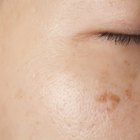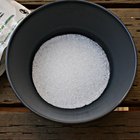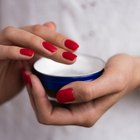If you suffer from acne, you might have exhausted over-the-counter treatments and don't want to try prescription medications. Acne is common in the teen years and affects around 85 percent of people at some time in their lives, according to the American Academy of Dermatology. You might see potassium alum advertised as an acne treatment, although it's more often suggested as a natural deodorant. Ask your doctor before using potassium alum to treat acne.
Definition
Potassium alum is a mineral found in two forms, a rock form, called kalunite, and a fiber form, called kalinite. Potassium alum is approved by the Food and Drug Administration for use in cosmetics and is also used in manufacturing.
Actions
This mineral acts as an astringent. Astringents dry the skin. Astringents also have a mild antiseptic effect when applied to your skin. Astringents also remove dead skin cells from your skin's surface. Your skin might feel tight or tingling after applying astringents such as potassium alum, according to Skin-care-tips.org.
Effectiveness
If you have very oily skin, an astringent such as potasssium alum might help acne. However, if you do not have excessively oily skin, you should not use astringents because of their harsh effects on your skin, according to the National Institute of Arthritis and Musculoskeletal and Skin Diseases. If you do use astringents such as potassium alum, dab them only on the oily spots. Astringents, although often used as acne treatments, do not have clinically proven benefits, dermatologist Dr. David Leffel of Yale School of Medicine states in his 2000 book, "Total Skin: The Definitive Guide to Whole Skin Care for Life."
Side Effects
Astringents such as potassium alum can dry your skin too much, causing skin to peel and look dry and flaky. If you have sensitive skin, astringents can cause rashes, redness, burning and irritation. Ask your doctor for the most effective type of acne treatment for your skin.
Related Articles

Baking Soda for Acne Scars & Wrinkles

How to Use a Permanent Adhesive on My ...

Zinc Treatment for Rosacea

How to Reduce Acne Inflammation

How to Use Copper Peptide With Vitamin C

How to Remove the Smell of Cologne From ...

List of Retinoids

How to Use Clearasil

Nutrition Information on Blueberries

How to Make Xylitol Toothpaste

Possible Side Effects of Obagi

The Difference Between Retin A & Renova

Benefits of Shea Butter and Coconut Oil ...

Arnica for Acne

Definition of Skin Bleaching

How to Reduce Scars With Supplements

What Are the Benefits of Ashwagandha in ...

Vitamins for Mental Alertness

How to Remove a Dilated Pore on the ...

Review of New-Skin Scar Therapy
References
Writer Bio
A registered nurse with more than 25 years of experience in oncology, labor/delivery, neonatal intensive care, infertility and ophthalmology, Sharon Perkins has also coauthored and edited numerous health books for the Wiley "Dummies" series. Perkins also has extensive experience working in home health with medically fragile pediatric patients.